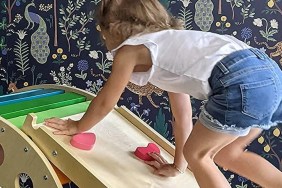So a new baby is on the way, let the celebrations go wild!, However when I was expecting my second baby I know my toddler wasn’t at all ready to join in the festivities. Matter of fact, he was downright miserable at the thought of a new sibling on the way.
While it was tempting to unceremoniously kick our toddler out of the cot and into a bed, declaring he was now a “big kid” in preparation for baby; it was definitely not the introduction to his little sibling I knew he needed. Here are some ideas we used to help make his transition smoother.
1. Prepare, prepare, prepare. While I wouldn’t advocate telling your older child you’re expecting a new sibling as soon as you see those two lines on the stick, it is a good idea to start preparing your toddler for a new baby sooner rather than later.
We let our boy spend some time with other babies and talked to him about what happens when the baby is born and when it comes home. We also read books such as There’s a house inside my mummy to prepare him for the changes ahead.
2. Don’t make it all about the baby. When the house filled up with visitors who were all doting over the new addition, it was easy for my son to feel left out and rejected. We made sure we continued to give him attention and encouraged our visitors to do the same.
We made it his very-important job to introduce his new brother to visitors and praised him for the way he was helping and for how gentle he was being. When visitors brought gifts, we let our toddler open the baby’s presents (luckily newborns are generally pretty accommodating when it comes to sharing their things).
3. Keep a routine. While in the early days newborns don’t tend to operate to a routine, toddlers thrive on them. With our older child being passed between friends and grandparents, hospital visits and time with Dad, it’s was essential to try and maintain some consistency for him. We tried to keep his nap and bedtimes consistent and keep any weekly activities going where we could. The more consistency you can maintain the easier the transition will be for your older child.
4. Get them involved. Toddlers and preschoolers tend to love helping. We let our little man help with bathing and nappy changes and he was allowed to place the blanket over the bub in bed and rock the bassinet (gently!).
We actively tried to find things we could say “yes” to him helping with, and tried to phrase our requests in a positive way. Rather than “don’t be so rough”, we would say “remember to use nice gentle hands”. We tried to praise him when he was being gentle and co-operative more often than admonishing him for wrongdoing. Don’t be too worried – newborns are far more robust than we give them credit for.
5. Make time for them. Even though our older child had gone from being the baby to the big brother, he still needed us just as much as before (maybe even more!). We took time out to be with only him as often as we could – something we still try to do to this day. Even a short play at the park or some one on one story time was enough to help him feel included and valued.
6. Expect regressions. No matter how prepared you are or how well the initial introductions seem to go, it’s likely your child will have at least some periods of regression in your older child when a new baby arrives. Our boy certainly did. Your toddler may start having toileting accidents, revert to “baby talk” or refuse to feed himself. Be patient and try not to get angry with him. It is totally normal and I promise that it will pass.
I have to say that while I prepared for the logistics of adding an extra child to our family, what I wasn’t prepared for was the incredible joy of watching my boys interact with each other. They couldn’t be more different in personality, they are the best of buddies. Enjoy this precious time!
More advice for creating sibling harmony:
- How to create a strong sibling bond
- 6 steps to taming sibling rivalry
- 5 after-school activities siblings can do together
Image: Michelle Thompson-Laing








